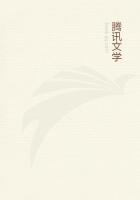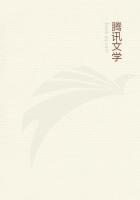When, after the record of the death of Terah, the father of Abraham, we next read, "And the Lord said to Abram, Get thee out of thy country, and from thy kindred, and from thy father's house,"(5) etc., it is not to be supposed, because this follows in the order of the narrative, that it also followed in the chronological order of events.For if it were so, there would be an insoluble difficulty.For after these words of God which were spoken to Abraham, the Scripture says: "And Abram departed, as the Lord had spoken unto him; and Lot went with him.Now Abraham was seventy-five years old when he departed out of Haran." (6) How can this be true if he departed from Haran after his father's death? For when Terah was seventy years old, as is intimated above, he begat Abraham; and if to this number we add the seventy-five years which Abraham reckoned when he went out of Haran, we get 145 years.Therefore that was the number of the years of Terah, when Abraham departed out of that city of Mesopotamia; for he had reached the seventy-fifth year of his life, and thus his father, who begat him in the seventieth year of his life, had reached, as was said, his 145th.Therefore he did not depart thence after his father's death, that is, after the 205 years his father lived; but the year of his departure from that place, seeing it was his seventy-fifth, is inferred beyond a doubt to have been the 145th of his father, who begat him in his seventieth year.And thus it is to be understood that the Scripture, according to its custom, has gone back to the time which had already been passed by the narrative; just as above, when it had mentioned the grandsons of Noah, it said that they were in their nations and tongues; and yet afterwards, as if this also had followed in order of time, it says, "And the whole earth was of one lip, and one speech for all." (1) How, then, could they be said to be in their own nations and according to their own tongues, if there was one for all; except because the narrative goes back to gather up what it had passed over? Here, too, in the same way, after saying, "And the days of Terah in Haran were 205 years, and Terah died in Haran," the Scripture, going back to what had been passed over in order to complete what had been begun about Terah, says, "And the Lord said to Abram, Get thee out of thy country," (2) etc.After which words of God it is added, "And Abram departed, as the Lord spake unto him; and Lot went with him.But Abram was seventy-five years old when he departed out of Haran." Therefore it was done when his father was in the 145th year of his age;for it was then the seventy-fifth of his own.But this question is also solved in another way, that the seventy-five years of Abraham when he departed out of Haran are reckoned from the year in which he was delivered from the fire of the Chaldeans, not from that of his birth, as if he was rather to be held as having been born then.
Now the blessed Stephen, in narrating these things in the Acts of the Apostles, says: "The God of glory appeared unto our father Abraham, when he was in Mesopotamia, before he dwelt in Charran, and said unto him, Get thee out of thy country, and from thy kindred, and from thy father's house, and come into the land which I will show thee." (3) According to these words of Stephen, God spoke to Abraham, not after the death of his father, who certainly died in Haran, where his son also dwelt with him, but before he dwelt in that city, although he was already in Mesopotamia.
Therefore he had already departed from the Chaldeans.So that when Stephen adds, "Then Abraham went out of the land of the Chaldeans, and dwelt in Charran," (4) this does not point out what took place after God spoke to him (for it was not after these words of God that he went out of the land of the Chaldeans, since he says that God spoke to him in Mesopotamia), but the word "then" which he uses refers to that whole period from his going out of the land of the Chaldeans and dwelling in Haran.Likewise in what follows, "And thenceforth, when his father was dead, he settled him in this land, wherein ye now dwell, and your fathers," he does not say, after his father was dead he went out from Haran; but thenceforth he settled him here, after his father was dead.It is to be understood, therefore, that God had spoken to Abraham when he was in Mesopotamia, before he dwelt in Haran; but that he came to Haran with his father, keeping in mind the precept of God, and that he went out thence in his own seventy-fifth year, which was his father's 145th.
But he says that his settlement in the land of Canaan, not his going forth from Haran, took place after his father's death; because his father was already dead when he purchased the land, and personally entered on possession of it.But when, on his having already settled in Mesopotamia, that is, already gone out of the land of the Chaldeans, God says, "Get thee out of thy country, and from thy kindred, and from thy father's house," (5) this means, not that he should cast out his body from thence, for he had already done that, but that he should tear away his soul.For he had not gone out from thence in mind, if he was held by the hope and desire of returning, --a hope and desire which was to be cut off by God's command and help, and by his own obedience.It would indeed be no incredible supposition that afterwards, when Nahor followed his father, Abraham then fulfilled the precept of the Lord, that he should depart out of Haran with Sarah his wife and Lot his brother's son.
CHAP.16.--OF THE ORDER AND NATURE OF THE PROMISES OF GOD WHICH WEREMADE TO
ABRAHAM, God's promises made to Abraham are now to be considered; for in these the oracles of ]our God, (6) that is, of the true God, began to appear more openly concerning the godly people, whom prophetic authority foretold.The first of these reads thus:

